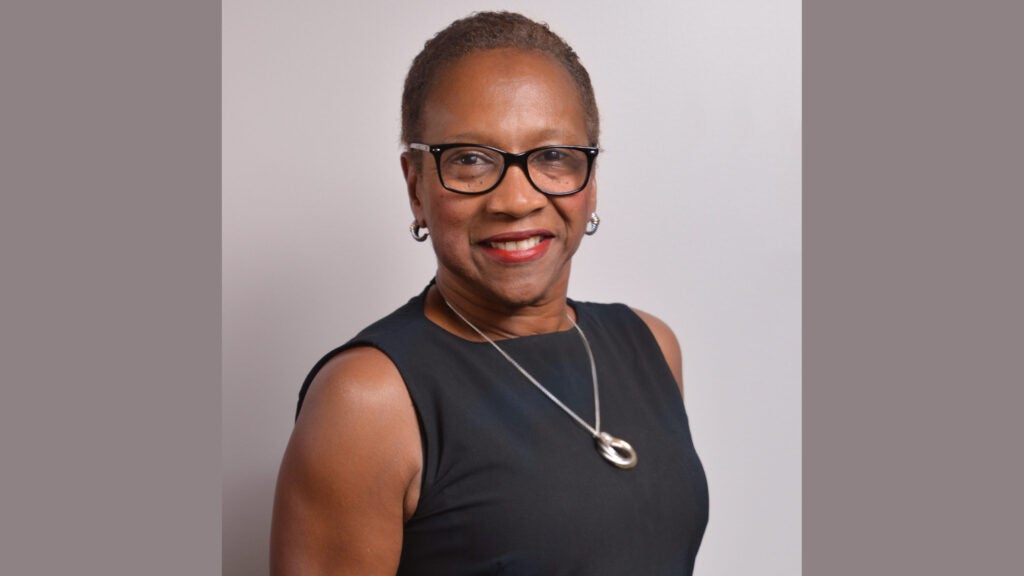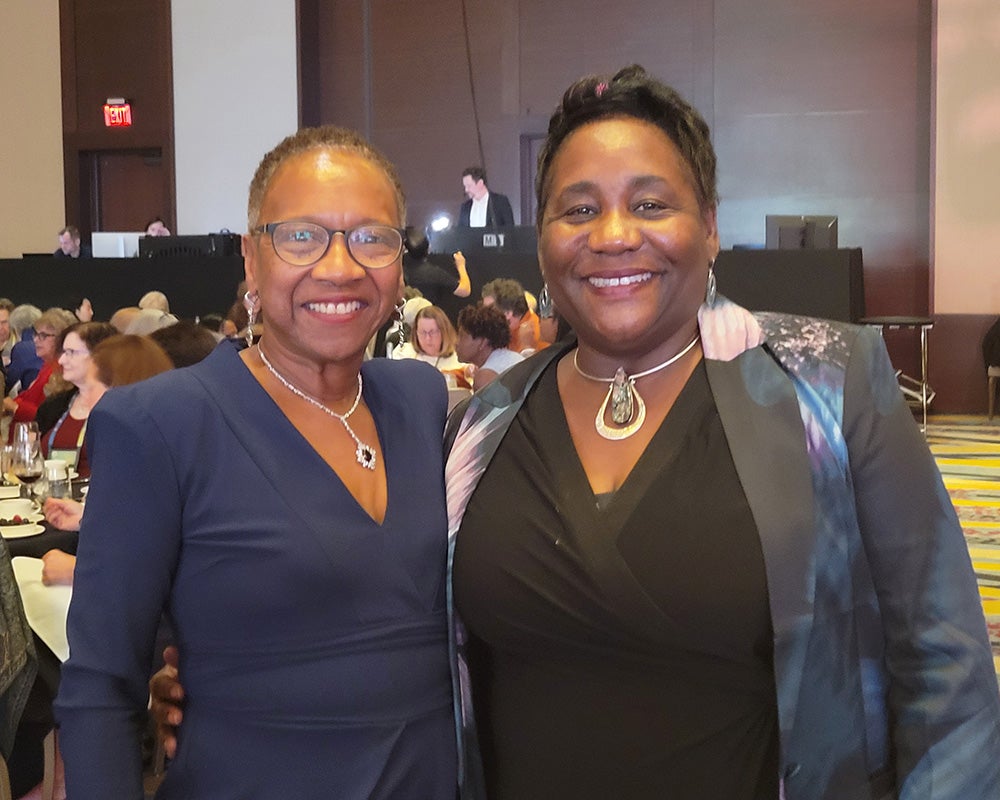Expert on Community-Engaged Research to Speak at School of Nursing Commencement Ceremony

(April 28, 2025) — Throughout her career, Loretta S. Jemmott, PhD, MSN, RN, has done research to reduce the risk of developing STDs in diverse populations in Botswana, South Africa, Jamaica, Mexico and Puerto Rico, but her heart has always stayed in Philadelphia, her hometown.
“Philly is home,” said Jemmott, the M. Louise Fitzpatrick Endowed Professor of Community and Home Health Nursing at Villanova University’s Fitzpatrick College of Nursing. “Philly is where I grew up. Philly is where my people are. Philly is where my village is and where my support team is. All of those linkages made me want to stay because I was rooted in Philly and rooted to do stuff that’s going to empower and impact the community where I was growing up.”
In recognition of her dedication to the advancement of health justice through evidence-based, community-engaged research in Philadelphia and around the world, Jemmott will give the commencement address and receive an honorary doctor of science degree at Georgetown’s School of Nursing commencement ceremony on the Healy Lawn.
First-Generation Student to Teen Pregnancy Prevention Educator
Growing up in an impoverished neighborhood in West Philadelphia, Jemmott was a first-generation college student at the Hampton Institute (now Hampton University) in Virginia, where she earned her BSN before returning to Philadelphia.
“Back in those days, we wore white uniforms and white hats,” she said. “It was important to my parents to see that. It was exciting for them to see me do that, so I stayed in Philadelphia.”
Troubled by the high rates of teen pregnancy in her hometown, Jemmott worked with a doctor to create a teen pregnancy prevention initiative and led workshops at clinics, schools and community agencies. “My goal was to reduce teen pregnancy, because I saw that most of the kids in the neighborhood who got pregnant couldn’t finish high school,” she said.
However, Jemmott soon learned that her initiative wasn’t working, prompting her to earn an MSN in child, adolescent and family mental health nursing and a PhD in human sexuality education from the University of Pennsylvania.
“The kids were still doing the behavior and I didn’t understand why,” she said. “I realized that what I was doing was talking to the kids in a vacuum and not realizing that each kid was involved in a system of family and friends. And so I needed to understand that it wasn’t just them. It was all the people around them that were impacting their behavior.”
‘The Code of the Streets’
In the first year of her doctoral program, a professor told Jemmott’s class that they need to learn “the code of the streets” when they work within a given community.
“He said, ‘If you want to know what’s going on and change the community, you’ve got to spend time in the community to learn the code of their street,’” she said. “You’ve got to take time to understand the code of their street. And so I spend a lot of time trying to understand the different codes of different streets in different communities before I talk about what we’re going to do there.”
That message resonated deeply with Jemmott, contributing to her success as a researcher.
“If you make people feel valued, respected, included and heard, you’ve done something important,” she said. “You can increase health equity and you can reduce all the negative stuff and you can promote the health outcomes you want.”
‘And the Rest Was History’
When Jemmott completed her PhD in 1987, the HIV/AIDS crisis was underway, so she shifted her focus from teen pregnancy and STD prevention to the emerging epidemic. She and her research partner applied for a grant from the American Foundation for AIDS Research to design an intervention to reduce risky sexual behavior among Black male teenagers in West Philadelphia.
“We designed the intervention based on all of the stuff I’d done over the years in my program and talked to my consultants at Penn, and we did a randomized controlled trial, and the rest is history,” she said. “It was published in the American Journal of Public Health, and then that began my journey of designing interventions to reduce risky behavior.”
A few years later, Jemmott’s research partner became her husband, a faculty member at the University of Pennsylvania. Together, they have received more than $150 million in NIH grant funding for their work designing and testing interventions to reduce the risk of HIV and STDs.
“He was in all of my research since the time we’ve been dating, and we’ve been married since 1989,” she said. “We’re still doing research together.” The couple’s work influenced their two daughters, who were also raised in Philadelphia. Their older daughter is earning her doctorate in nursing, while their younger daughter is working in public policy.
Establishing a Community Health Hub
After working at Rutgers University and Columbia University, Jemmott was recruited by her alma mater, the University of Pennsylvania, where she spent 20 years working on health equity research and training early-career researchers.

Jemmott with Roberta Waite, EdD, RN, PMHCNS, ANEF, FADLN, FAAN, dean of the School of Nursing
In 2015, Jemmott started serving as vice president for health and health equity and professor in the College of Nursing and Health Professions at Drexel University, just a few blocks from her childhood home. Determined to help improve the health of the community’s residents, she conducted a qualitative needs assessment, engaging with more than 1,140 individuals over 18 months.
“They wanted me to focus on them in a community setting that was warm and respectful and inclusive and made it feel like they were invited,” she said. “Based on the data we received from the residents, we created the Community Wellness Hub.”
Today, the Community Wellness Hub offers health and wellness programming and education in seven areas identified by community members. Two years later, a donor contacted Jemmott and expressed interest in working with her to encourage community participation in cancer clinical trials.
“If you’re going to do anything around cancer, we’ve got to begin by talking about cancer awareness,” she said. “We talked to 400 people about their cancer concerns and what they wanted and their knowledge.”
Jemmott’s work led to the launch of the Lazarex Cancer Wellness Hub, which provides cancer education and connections to screenings, treatment and clinical trials, and resources for caregivers and survivors.
“It gave me a wonderful feeling of satisfaction that I was able to go home and do something for my own neighborhood,” Jemmott said. “Can you imagine having that opportunity to create an impact, to do something to improve the health of the impoverished neighborhood that you grew up in? That’s the best thing I’ve done to give back so far.”
Inspiring the Next Generation
At Villanova, Jemmott wants to inspire the next generation of scholars and researchers to listen to the communities they serve.
“I’m really committed to training the next generation of scholars and students to do this kind of research,” she said. “So I’m teaching health equity and I’m going to teach community engagement. I’m going to show these new faculty and new students how to do the kind of research that I’ve been successful in doing.
“My whole goal in life right now is to give voice to the voiceless and provide hope to the hopeless,” she added. “And that’s my mission as I do community-engaged research.”
Kat Zambon
GUMC Communications
- Tagged
- Commencement 2025
